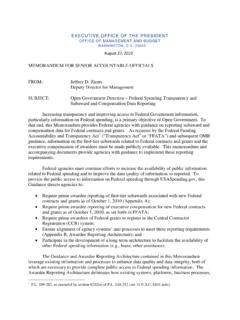Transcription of HOW LAWS AND REGULATIONS AFFECT CREDIT UNIONS
1 1C H A P T E R O N EHOW laws AND REGULATIONS AFFECT CREDIT UNIONS This chapter covers the chartering, structure, and oversight of federal CREDIT UNIONS , including a discussion of the federal CREDIT Union Act, the various sources of authority issued by the National CREDIT Union Administration (NCUA), the role of NCUA as insurer, and the role of state regulators. We also briefly discuss federal financial institution legislation and regulation in consumer protection, employment, and other areas of interest to CREDIT union directors.
2 CHARTERING, STRUCTURE, AND OVERSIGHT AUTHORITYLike any other financial institution, CREDIT UNIONS are governed by the laws that allow them to be organized and maintained. The federal CREDIT Union Act is the legal founda-tion for federal CREDIT UNIONS . In addition, most states have their own CREDIT union laws , giving CREDIT UNIONS a dual structure for chartering and regulatory oversight. The National CREDIT Union Administration (NCUA) is the independent agency that exercises regulatory oversight of federal CREDIT UNIONS .
3 NCUA has authority over managing the National CREDIT Union Share Insurance Fund (NCUSIF) and examining both federal CREDIT UNIONS and federally insured state-chartered CREDIT UNIONS . Individual state CREDIT union acts also name the regulatory agency, establish the agency s power and authority, establish the form, structure, and powers of state-chartered CREDIT UNIONS , and specify share insurance requirements. federal CREDIT Union Act The federal CREDIT Union Act is the law that established NCUA. It also defines the basic structure of federal CREDIT UNIONS in such areas as chartering, field of membership, and loan and investment powers.
4 It outlines additional regulatory structures such as the NCUSIF, sets up NCUA s enforcement powers over federal CREDIT UNIONS , and defines CREDIT UNIONS rights to appeal certain agency actions. The act explains the requirements for federally insured CREDIT UNIONS and the scope of NCUA s authority over them. The federal CREDIT Union Act regulates federal CREDIT UNIONS in a number of impor-tant ways: Sets the process and requirements for chartering a federal CREDIT union, establishing its legal right to be recognized as a business entity.
5 Establishes volunteer boards, member ownership, and a not-for-profit democratic structure. Exempts federal CREDIT UNIONS from all taxes, except real and personal property taxes. Limits the powers of federal CREDIT UNIONS in certain areas, such as the types of loans and investments that are permitted to be made. Establishes NCUA as the regulatory authority over federal CREDIT UNIONS and some aspects of federally insured state-chartered CREDIT UNIONS ; explains the agency s exami-nation authority, including enforcement powers.
6 Appoints NCUA as the manager of the NCUSIF and establishes its authority to exam-ine and regulate federally insured state-chartered CREDIT UNIONS . Before a CREDIT union director makes a decision regarding a particular investment or a change in the CREDIT union s lending policy, he or she must first determine whether the CREDIT union s action is permissible under the federal CREDIT Union Act. The CREDIT union must then turn to the various other sources of NCUA authority for further guidance.
7 Sources of NCUA Authority NCUA is charged with the dual task of regulating federal CREDIT UNIONS and some aspects of federally insured state-chartered CREDIT UNIONS , and administering the NCUSIF. NCUA uses a number of tools to communicate its rules and opinions on compliance. 2 Chapter OneCredit union directors should familiarize themselves with the following sources of NCUA authority. These are summarized in figure The NCUA is charged with the dual task of regulating federal CREDIT UNIONS and some aspects of federally insured state-chartered CREDIT UNIONS .
8 NCUA Rules and REGULATIONS NCUA Rules and RegulationsAdministrative rules adopted by NCUA further define and clarify its authority over CREDIT UNIONS . NCUA rules address such issues as organization, operations of federal CREDIT UNIONS , investment and deposit activities, requirements for share insurance by federally insured state-chartered CREDIT UNIONS , board and committee duties and responsibilities, and REGULATIONS for the application of laws such as the Truth-in-Savings and Fair Housing Acts. Bylaws According to the requirements of the federal CREDIT Union Act, NCUA publishes the federal CREDIT Union Bylaws to provide boards of directors, CREDIT and supervisory commit-tees, and executive officers guidance for the sound management and proper operation of the CREDIT union.
9 NCUA adopted revised bylaws in 2007 and re-incorporated the bylaws as part of its Rules and REGULATIONS . In addition, although federal CREDIT UNIONS are required to use the bylaws published by NCUA, they have the flexibility to request nonstandard bylaw amendments if the need arises. Nonstandard bylaw amendments must be approved by the NCUA Board before they become effective. A federal CREDIT union wishing to adopt a non-standard bylaw amendment must file a request with the appropriate NCUA regional director.
10 According to the requirements of the federal CREDIT Union Act, NCUA publishes model bylaws as a guide for federal CREDIT UNIONS . NCUA also publishes standard amend-ments that federal CREDIT UNIONS can use to customize their bylaws to fit their indi-vidual operations, such as allowing mail ballots or board meetings by conference call. How laws and REGULATIONS AFFECT CREDIT UNIONS 3 Nonstandard amendments must be approved by NCUA to make sure they conform to the federal CREDIT Union Act and REGULATIONS .

